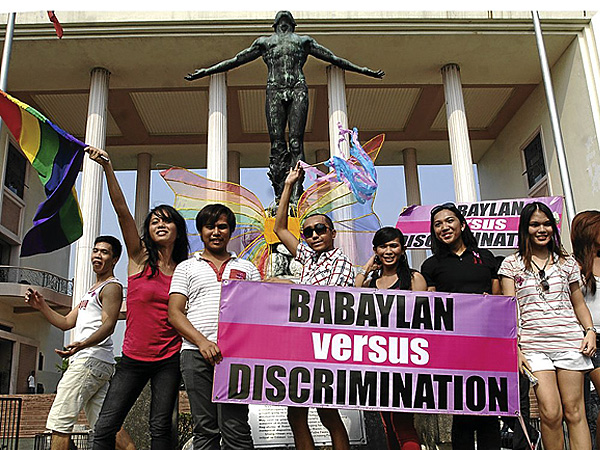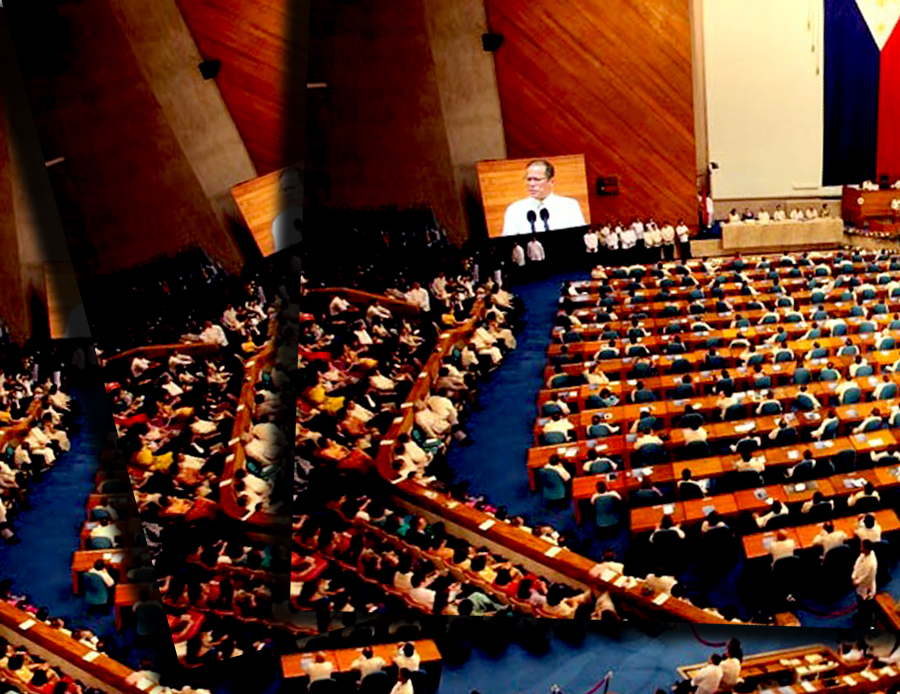By Fritz D. Rodriguez

While UP has become a hotbed of gender-open politics, the rest of the country still has a long way to go.
2012 proved to be a victorious year for advocates of LGBT (Lesbian, Gay, Bisexual, Transgender) rights. We have witnessed Uganda’s first Pride March, CNN’s Anderson Cooper coming out (via e-mail), and myriad celebrations of newlywed same-sex couples in different parts of the world.
Students in the University of the Philippines Diliman made history by electing Heart Dino as their University Student Council (USC) chairperson. Dino, a graduate student of Applied Mathematics, is the country’s first transwoman to serve as the highest leader of a student government. Pat Bringas, a transwoman majoring in Film, also won a seat in the council. Alex Castro, a Psychology student who identifies as a bisexual woman, was elected as USC vice-chair. She has since gone on to become USC chairperson herself (see Election Year 2013 section).
All three are active supporters of LGBT rights. However, their concerns and capacities as leaders are not limited to their gender advocacy.
The colorful mix of U.P. student leaders, in terms of backgrounds, ideas, and perspectives, seems to echo the university’s promise of freedom and diversity.
But is the university’s ever evolving politics reflective of the country’s changing views on gender and politics? Is U.P. a microcosm of Philippine society or is it only an outstanding exemption?
Long road to victory
Dino, a self-identified transwoman pushing for “zero cases of gender discrimination and sexual harassment,” is not the first to challenge the domination of men in the USC. Since its formation in 1913, the USC has had six chairwomen. In 1997, UP Diliman elected its first openly gay USC chairperson, Percival Cendaña – a member of UP Babaylan like Dino and Bringas.
UP Babaylan is an LGBT student organization which has been active since 1992. Unfortunately U.P. Sappho Society, the first university-based lesbian organization in the country founded in 1999, is now defunct. Outside the campus, there are many other groups focusing on LGBT empowerment such as LAGABLAB-Pilipinas (Lesbian and Gay Legislative Advocacy Network Philippines), TFP (Task Force Pride), ProGay (Progressive Organization of Gays in the Philippines), Rainbow Rights Project, STRAP (Society of Transsexual Women of the Philippines), LEAP (Lesbian Advocates Philippines), and CLIC (Can’t Live in the Closet).
The country’s first Pride March was held in 1994 – the very first in Asia. The 18th Pride March was held in December last year in Makati; U.P. also conducts its own Pride March every June. Such events are open to everyone who supports the fair representation and protection of individuals regardless of sex, sexual orientation, gender identity and expression, class, ethnicity, and religion. Pride Marches also highlight the struggles faced by the LGBT community, as well as their positive contributions in society.
It is not only supporters who flock to the yearly event, however. Protestors carrying hateful placards opposing same-sex love manage to harass Pride March participants.
In 2003, Ateneo de Manila University professor Danton Remoto founded Ladlad, the country’s first LGBT political party. It was twice disqualified by the Commission on Elections (Comelec): in 2007 elections due to lack of nationwide membership, and in 2010 on grounds of “immorality.” The Supreme Court then overturned the Comelec decision and allowed Ladlad to participate in the 2010 elections. Ladlad, however, did not win. In May 2013, Ladlad will once again run as a partylist.
The Philippines has never had an openly LGBT individual elected into national office. There are some, however, who have been elected in local government positions.
No national laws
Despite the many improvements observed within and outside UP, no national laws protecting LGBTs have been formally implemented. The Anti-Discrimination Act of 2010, authored by Bayan Muna Rep. Teddy Casino, has yet to be approved. The proposed bill seeks to prevent any kind of discrimination based on a person’s sexual orientation and gender identity.
The lack of a national law hasn’t prevented some local governments from taking action – Quezon City, Cebu City, Albay, and Davao City each have their own Anti-Discrimination ordinances.
Groups such as the Catholic Bishops’ Conference of the Philippines (CBCP) have been vocal in opposing laws which aim to provide the same kinds of services to all citizens regardless of sexual orientation and gender identity. A favorite talking point is the fear that the creation of such laws may lead to the approval of same-sex marriages in the future.
Even as society has been quick to accept members of the LGBT community like Vice Ganda and Aiza Seguerra as pop culture icons, Filipinos still seem a long way from fully embracing the concept of gender equality.
LGBT-related cases in UP
The university seeks to promote “gender rights as human rights” through the UP Diliman Gender Office (UPDGO) and the Office of Anti-Sexual Harassment (OASH). These two aim to prevent any form of gender violence, discrimination, and oppression by spreading awareness and clearing misinformation.
The university also offers gender-related courses such as gender and development, queer cinema, gay literature, and LGBT psychology – a first of its kind in the country.
In 2011, Hender Gercio, a self-identified transwoman, filed a complaint against a foreign language professor of the College of Arts and Letters (CAL) for refusing to address Gercio using a female pronoun. The issue sparked an online debate regarding freedom over one’s gender identity and freedom over one’s religious beliefs, the professor having had cited religious reasons to justify her actions. Since there are no university policies addressing transgender students, the professor was not sanctioned for any violation.
Cases like this have shed light on the need to reevaluate existing policies, or lack thereof, regarding gender diversity. It also suggests that confusion still thrives even within respected institutions in the university – confusion over the concepts of sex, gender identity, and sexual orientation.
There are only two biological sexes, female and male; however, gender identity is more complex. The latter refers to how a person feels, views, and identifies oneself. One’s biological sex does not always match one’s gender identity. A transwoman is someone who is born biologically male, but identifies as a woman; while a transman is someone who is born biologically female, but identifies as a man.
Sexual orientation is concerned with attraction; some people are attracted to the opposite sex, some to the same sex, some to both, some to neither, and for others, such labels and distinctions do not matter.
What is being done
According to the UPDGO, they have handled at least ten LGBT-related cases of harassment or discrimination since 2007. This is less than 10% of the overall cases reported to the UPDGO, which handles cases both within and outside UP. Seven of the cases were filed by students, one by a professor, and two by non-UP residents.
The cases involve family conflicts, abusive relationships, sexual harassment between students, and false allegations. One student sought help from the UPGDO because the organization he was applying for did not accept gay members. The issue was later resolved when the organization decided to change its policies.
The UPGDO also provides Gender Sensitivity Trainings (GSTs) to student organizations. Around 700 students participate in the GSTs every semester. Prescilla Tulipat, UPDGO’s guidance service specialist, says that such trainings are effective in providing students with a better understanding of and respect for oneself and others.
As part of its continuing efforts to support the LGBT community, the UPGDO is also strengthening its programs aiming to resolve family conflicts. Students in need of counseling or any form of help may visit the gender office anytime.
One of the biggest problems faced by the university, according to Tulipat, is misinformation and the lack of information on gender not only among students, but also within the administration. In some cases, the administrators themselves do not know what to do.
“Authorities mismo need knowledge,” she adds.
What still needs to be done
Tulipat says that although the UP Charter promotes the rights of everyone in the University, it will be better to create more specific university policies to protect the rights of its LGBT community.
She observed that efforts to mainstream the LGBT curriculum have been done mostly by individual faculty members and student organizations. She suggests that the university and its leaders must recognize the need for a more systematic and specific implementation of policies.
“Sana buong UP Diliman, i-mainstream ang LGBT community,” Tulipat wishes.
Future of gender and politics
Tulipat is looking forward to a better Philippines, one that is more open to changes, “kahit paunti-paunti.”
She calls Dino’s victory in the USC as a “breakthrough.” She congratulates student leaders like Dino for coming out and for actively addressing the concerns of LGBTs.
Tulipat sees UP as a model for gender and politics in the Philippines, adding that if the University can do it, the whole country may soon follow. “Parang testing ground ang UP, kaya yan, nauna lang tayo.”
(photo credits: thepinoyweekly.com)

